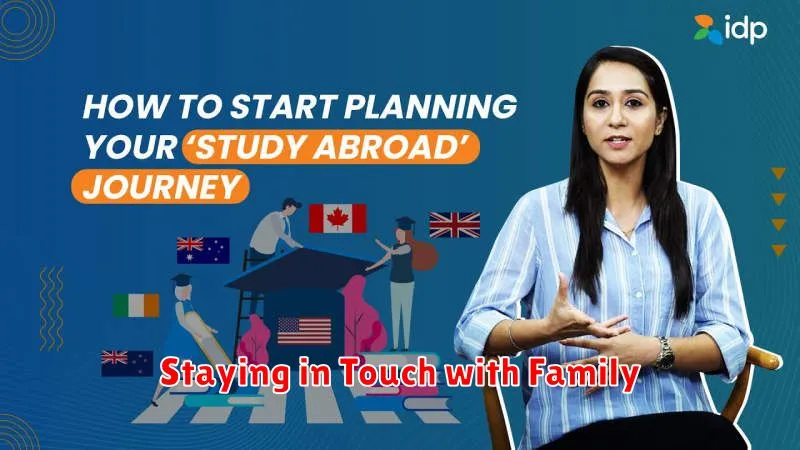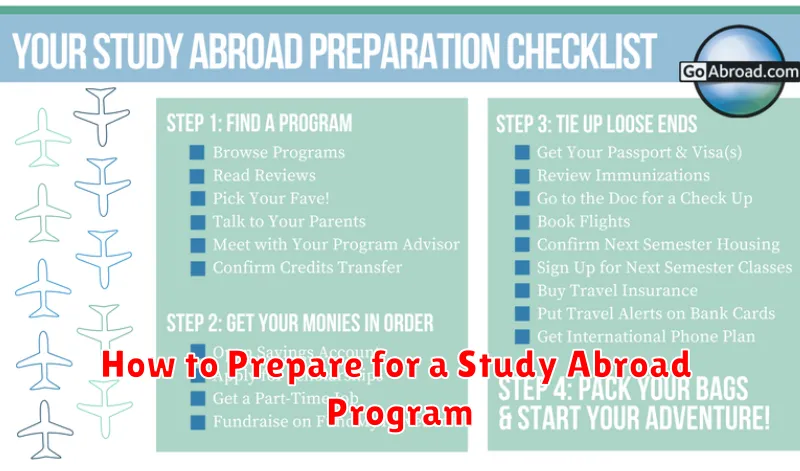Embarking on a study abroad program is a transformative experience, offering unparalleled opportunities for academic growth, personal development, and cultural immersion. Proper preparation is essential for maximizing the benefits and minimizing potential challenges. This comprehensive guide will equip you with the essential knowledge and actionable steps necessary to navigate the pre-departure process effectively, ensuring a smooth transition into your study abroad program. From visa applications and financial planning to academic considerations and cultural adaptation, we will cover all the crucial aspects of preparing for this exciting chapter of your life. Whether you’re considering a semester-long exchange, a summer intensive course, or a full degree program abroad, this guide will help you prepare for a rewarding and enriching study abroad experience.
This article will delve into the crucial aspects of preparing for a study abroad program. We will explore the intricacies of visa applications, providing step-by-step guidance to ensure a successful outcome. Furthermore, we will address the importance of financial planning, including budgeting, scholarship opportunities, and managing expenses in a foreign currency. Academic considerations, such as course selection, credit transfer, and academic expectations, will be thoroughly examined. Finally, we will discuss strategies for cultural adaptation, including language acquisition, cultural sensitivity, and building a support network abroad. By addressing these key areas, this guide aims to empower prospective study abroad students with the tools and resources they need to embark on their international journey with confidence and preparedness.
Choosing the Right Program
Selecting the right study abroad program is a crucial step in ensuring a successful and enriching experience. Consider your academic goals first. Does the program align with your major or offer courses that fulfill degree requirements? Think about the program’s academic rigor and whether it offers the level of challenge you seek.
Location is another key factor. Reflect on your personal interests. Are you drawn to bustling cities or tranquil rural settings? Consider the local culture, language, and climate. Research the cost of living and safety of the region.
Program duration also plays a significant role. Are you looking for a short-term summer program or a full academic year exchange? Consider how long you can realistically be away from your home institution and how much time you need to achieve your academic objectives.
Finally, examine the program’s structure and support services. Does it offer excursions or cultural immersion activities? Is there on-site staff to assist with housing, visa applications, and cultural adjustment? A comprehensive program can greatly enhance your overall experience.
Applying for Visas and Documents
One of the most crucial steps in preparing for your study abroad program is securing the necessary visas and documents. Start this process early, as it can often be time-consuming.
Visa requirements vary significantly depending on your destination country and citizenship. Consult your host country’s embassy or consulate website for specific instructions and required documentation. Be prepared to submit documents such as your passport, acceptance letter from your host institution, financial statements, and proof of health insurance.
In addition to a visa, you may need other documents, such as a student ID card, residence permit, or travel insurance. Your host institution can typically provide guidance on these requirements.
Ensure your passport has sufficient validity remaining, typically six months beyond your intended stay. If not, renew it well in advance of your departure date.
Keep copies of all important documents, both physical and digital. This will be helpful in case of loss or theft.
Learning Local Customs and Culture

Immersing yourself in the local culture is a crucial aspect of a successful study abroad experience. Researching customs and traditions before you depart will help you navigate social situations with greater ease and respect.
Language learning, even basic phrases, demonstrates a willingness to engage with the host culture. This effort can significantly enhance your interactions with locals.
Consider exploring local cultural events, historical sites, and cuisine. These experiences offer valuable insights into the community’s heritage and values. Be open-minded and embrace new perspectives, even if they differ from your own.
Respectful communication is paramount. Be mindful of local norms regarding greetings, personal space, and dining etiquette. Demonstrating cultural sensitivity fosters positive relationships and a richer learning experience.
Managing Finances Abroad

Budgeting is paramount for a successful study abroad experience. Before departure, create a comprehensive budget encompassing tuition, accommodation, travel, food, entertainment, and unforeseen expenses. Research the cost of living in your host country to create a realistic budget.
Open a bank account in your host country or utilize a fee-free international debit card to avoid excessive transaction charges. Inform your home bank of your travel dates to prevent any issues with card usage abroad.
Explore scholarship opportunities and financial aid specifically designed for study abroad programs. Many institutions offer funding to alleviate the financial burden of international education.
Track your spending diligently while abroad. Utilize budgeting apps or maintain a spreadsheet to monitor expenses and ensure you stay within your allocated budget.
Be mindful of currency exchange rates and utilize reputable exchange services to secure the best rates. Avoid exchanging money at airports or tourist hotspots, as these locations often offer unfavorable rates.
Packing Essentials for Long-Term Travel
Packing for an extended period can be daunting. Careful planning ensures you have everything necessary without overpacking. Start with the essentials.
Clothing
Choose versatile clothing items that can be mixed and matched. Pack for the expected weather at your destination. Consider lightweight, quick-drying fabrics. Don’t forget comfortable walking shoes.
Documents and Finances
Keep your passport, visa, and other important documents safe and accessible. Inform your bank of your travel dates. Carry a mix of payment methods, including a credit card and some local currency.
Electronics
Bring necessary electronics, such as a laptop, phone, and chargers. Consider a universal adapter for international travel. A portable power bank can be useful for long journeys.
Toiletries and Medications
Pack travel-sized toiletries to save space and weight. Carry any prescription medications in their original containers, along with a copy of your prescription. A small first-aid kit is also recommended.
Staying in Touch with Family

Maintaining regular contact with family while studying abroad is crucial for emotional well-being and can help ease feelings of homesickness. Communication is key to bridging the distance.
Before you depart, discuss communication expectations with your family. Decide on preferred methods and frequency of contact. Will you primarily use video calls, messaging apps, or emails? How often will you connect?
Consider factors such as time zone differences when scheduling calls. A little planning can make a big difference in ensuring successful communication. Inform your family about your schedule and potential challenges with connectivity.
Building a Support Network
A strong support network is crucial for a successful study abroad experience. This network will provide you with emotional, practical, and social support before, during, and after your program.
Connecting with Program Alumni
Reach out to students who have previously participated in the same program. They can offer invaluable insights into the specific challenges and opportunities you might encounter. Ask about their experiences with housing, cultural adjustment, and academics.
Utilizing On-Campus Resources
Your university’s study abroad office is a key resource. Advisors can assist with pre-departure logistics, visa applications, and cultural preparation. They can also connect you with relevant student organizations and support services.
Family and Friends
While you’ll be building new relationships abroad, maintaining connections with family and friends back home is essential. They can offer encouragement during challenging times and celebrate your successes. Establish clear communication channels before you depart.
Safety Tips While Studying Overseas
Prioritizing your safety is paramount while studying abroad. Research your destination thoroughly beforehand, paying close attention to local laws, customs, and any potential safety concerns. Register with your embassy or consulate upon arrival to facilitate communication in case of emergencies.
Share your itinerary with family and friends, including contact information for your accommodation and program coordinators. Maintain regular communication with them to assure them of your well-being. Be aware of your surroundings at all times and avoid walking alone, especially at night. Protect your valuables by using secure bags and avoiding displaying expensive electronics or jewelry.
Learn basic phrases in the local language for emergencies and directions. Carry a local SIM card for easy communication and access to maps and translation apps. Familiarize yourself with local emergency numbers and the procedures for contacting emergency services. Exercise caution when using public transportation and be mindful of your belongings.

